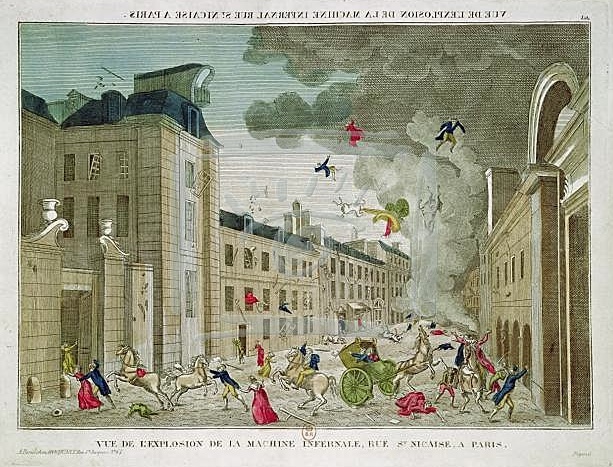
They say that spying is the world’s second oldest profession and certainly there is a long history of spies working for Britain. During the Revolutionary and Napoleonic wars there were spies working for the Admiralty, intercepting letters at the post office, sent by the Duke of York as commander-in-chief of the army, and, of course, the Duke Wellington famously employed exploring officers in the peninsula. However, the Alien Office, Britain’s premier spy organisation during the wars with France wasn’t created with espionage in mind but soon found itself running networks of agents that spanned Europe and penetrated the highest levels of the French government.
Formation
As France became embroiled in revolution the British government feared contagion above all else. Radical movements within Britain hoped to emulate the French example, and the flood of refugees from France provided ample cover for French agents sent by the National Convention. In 1792 parliament passed the Police Bill as a response. Prior to this there had been no system of policing the population in England, but there had been Scotland following the Jacobite rebellion. The City of London feared for their freedoms and so were excluded; the reason the city still has a separate police force. Eight stipendiary magistrates would answer to the King and his ministers, not parliament, and would have a remit to prevent revolution. Each magistrate would be assisted by clerks and six constables. One of the first magistrates was William Wickham who had links with a powerful Swiss banking family. His Swiss links soon brought him into contact with emigres and the Swiss who were having their own problems with revolutionaries.
In 1793 the Alien Act was passed. This required all foreigners in Britain to register with the government and suspended Habeas Corpus so that they could be arrested without trial. The Alien Office was created to manage the registration process and it was given office space in Crown Street, near Downing Street. Alien Office agents assisted customs officers in Dover to screen those arriving from France. The first Superintendent of Aliens was William Husskinson but when the government changed in 1794 William Wickham took over.
Evolution
Wickham had long been lobbying the king for a more active use of the emigres and their networks of friends and relations still in France, Switzerland and other nations affected by revolution. As many British institutions have before and since the Alien Office seemed to have found its role almost by accident. What started with registering aliens evolved into gleaning what was going on in France, and then this led to actively seeking to foster counter-revolution and revolt against Paris.
Networks of agents based on the contacts of particular emigres were called agencies and operated from neutral countries bordering France. Dried flowers, including Pimpernels, were used as identity tokens between agents. After Louis XVI had been executed and France declared war on Britain the activities of the Alien Office expanded greatly and it began to support uprisings within France such as the long running one in the Vendée.
France was in a state of flux. As coups changed the government in Paris the loyalties of the emigres working for the Alien Office frequently changed. Some, like Louis Bayard, were said to be double, or triple agents. Bayard was paid £1000 per month (worth up to £1M today) for running a network of agents. Bayard provided vital military, naval and political intelligence but also may have been working, at least part of the time, for the French. Georges Cadoudal was a Breton peasant who led an uprising and defeated a French army. He too charmed British ministers for funds and for a time ran a training school for Alien Office spies. Plans would ebb and flow as some royalists reconciled themselves to the new order or fought amongst themselves. The French police became more adept at infiltrating the networks but the Alien Office learned from early mistakes and became a more professional organisation soon having agents at the very top of the French police system itself.
Napoleon Bonaparte
The rise of Napoleon Bonaparte forced some Royalists to think that the Bourbon monarchy would never be restored and led to many reconciling themselves with the new reality and returning to France. However, while that may have denied the Alien Office some agents it also led to a new source of assistance in France – those jealous of Bonaparte’s success. It also gave them a single target for operations. Royalists linked to the Alien Office, including Cadoudal, were involved with the Rue Niçaise bombing of Bonaparte when he was in a coach going to the opera. It almost succeeded. There are also links to the assignation of Tsar Paul of Russia, who had broken away from the coalitions against France and was supporting Bonaparte against Britain.
The Peace of Amiens caused a brief pause in Alien Office operations and a cut in personnel and budget but it used the time wisely to reconnect with agents in Paris. Few in Westminster were aware of the vast sums of money being directed to the Alien Office and the extent of its operations. Once war was declared again the funds resumed and the Alien Office began work on another plot to remove Bonaparte.
Grand Conspiracy
The plan was to replace Bonaparte with another French General, Moreau, before restoring the monarchy. Old networks and agents were revived and agents landed on the French coast. Bonaparte knew large portions of his police hierarchy were compromised and charged the head of the Gendarmerie Nationale, General Moncey, with squashing any plots against him. There were disagreements in the Royalist camp. How long would Moreau rule before handing over to the King? Moncey made some minor arrests and through torture received the names of those involved. Slowly the plot unraveled and many involved were captured and executed, Cadoudal amongst them. My novel, For Our Liberty, follows the missions of an Alien Office spy during this period.
In some ways the Grand Conspiracy marked the high water mark of the Alien Office. The collapse of the plot caused some embarrassment in London but links to the plotters were not proven. Fear of invasion became a priority and intelligence gathered by Alien Office agents did much to convince the government that Napoleon was not that serious about plans to land in England.
Once Napoleon crowned himself Emperor more Royalists reconciled themselves to the regime. The Alien Office cultivated a network of senior diplomats across Europe led by a French emigre working for the Russians, Comte d’Antraigues. He delivered the secret terms of the Franco-Russian Treaty of Tilsit and was offered the title of Director of Intelligence by the Foreign Secretary. There was still enough discontent within France at the Emperor’s constant thirst for war to give the Alien Office opportunities for other plots to overthrow him but those too all failed.
After Waterloo
After Napoleon had been finally defeated the Alien Office slowly withered and died. Agents and clerks were pensioned off and by the 1830s only one clerk remained. The Alien Act was not repealed until 1872. The Crown Street headquarters were demolished to make way for the Foreign Office building, who also took over responsibility for espionage but British spying returned to being ad hoc and amateurish until the establishment of the War Office Intelligence Branch in 1873.
References
Secret Service, British Agents in France 1792-1815 – Elizabeth Sparrow
Regency Spies – Sue Wilkes

Available from Amazon or directly from the publisher Helion, which means I make a little more rather than Amazon getting all the profit!